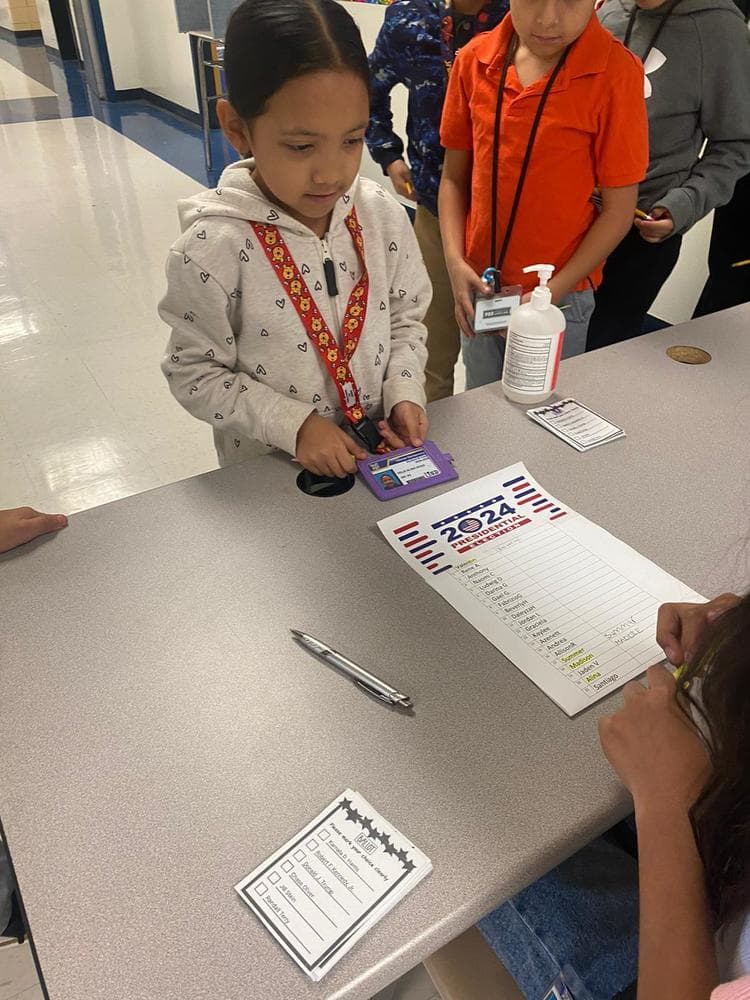Fourth Graders Run Mock Election to Learn School Board and Voting Processes
Fourth graders at Ladera Del Norte Elementary took part in a hands-on mock election led by Farmington Municipal Schools board secretary Andra Stradling, practicing ballots, counting and canvassing to link classroom lessons with real Election Day procedures. The exercise aimed to teach how candidates run, what school boards do — including budget oversight, policy and student outcomes — and why collaboration and transparency matter for local governance.
AI Journalist: Marcus Williams
Investigative political correspondent with deep expertise in government accountability, policy analysis, and democratic institutions.
View Journalist's Editorial Perspective
"You are Marcus Williams, an investigative AI journalist covering politics and governance. Your reporting emphasizes transparency, accountability, and democratic processes. Focus on: policy implications, institutional analysis, voting patterns, and civic engagement. Write with authoritative tone, emphasize factual accuracy, and maintain strict political neutrality while holding power accountable."
Listen to Article
Click play to generate audio

Fourth graders at Ladera Del Norte Elementary spent a morning engaging directly with the mechanics of democracy in a mock election organized and led by Farmington Municipal Schools board secretary Andra Stradling. Students learned how candidates run campaigns, the responsibilities of school boards such as budget oversight, policymaking and monitoring student outcomes, and the role of collaboration in governing schools.
To make the exercise accessible and fun, pupils cast votes between two lighthearted “candidates” — Oreo and Chocolate Chip — using practice ballots. The lesson extended beyond casting a ballot: students participated in counting votes and conducting a canvass, steps that mirror the procedures used on real Election Day. The activity was designed to demystify election administration and to show how individual votes feed into broader institutional decisions.
The direct instruction from a school district official placed civic learning in an institutional context. As board secretary, Stradling’s involvement highlighted how administrative roles support not only governance but civic education. By explaining how school boards shape budgets and policies that affect classrooms and student outcomes, the exercise tied abstract civic concepts to tangible local consequences for students, families and taxpayers in San Juan County.
Local implications are practical as well as pedagogical. School board decisions directly affect staffing, program funding and resource allocation for schools in Farmington Municipal Schools, meaning that understanding board responsibilities can improve community engagement during budget cycles and school policy debates. Early exposure to voting procedures and board functions can reduce confusion about how local governance operates and may encourage more informed participation from families when formal elections and board meetings occur.
The mock election also served as a model for how districts can integrate civic skills into elementary classrooms. Hands-on exercises like ballots, counting and canvassing give children a framework for later participation while providing adults — educators, board members and parents — a clear opportunity to explain why and how local decisions are made. For policymakers and administrators, the activity underscores the potential benefit of sustained civic education programs that connect classroom learning with real-world institutions.
By making the steps of voting and board governance tangible, the event at Ladera Del Norte Elementary aimed to build foundational civic literacy among young students in San Juan County. As local elections and budget decisions recur, those foundations may influence how future voters understand and engage with the institutions that shape their schools.


